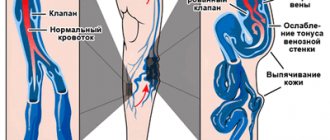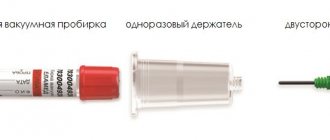In men who do not have health problems, the veins on the penis are almost invisible. They do not protrude above the surface of the skin, look like blue veins and have a diameter of 2-4 mm. There are many more veins on the penis than arteries. They are superficial and deep, intertwined with each other, participate in the erection process and ensure the outflow of blood saturated with carbon dioxide.
The venous trunks start from the head of the penis, pass through the corpus spongiosum and flow into the venous plexus surrounding the prostate. The veins on the penis dilate when a man is aroused and experiences desire.
Superficial veins protruding above the surface of the skin are not a pathology if their diameter does not exceed 4 mm. Otherwise, they talk about varicose veins on the penis - a disease that requires special treatment.
Enlarged veins on the penis look unaesthetic and cause a lot of inconvenience to the patient. They become deformed, stretch, protrude on the skin, become dense, hard and resemble bumps. The veins on the head of the penis swell and become clearly visible. Their walls become thinner, nodes and trophic ulcers form. These pathological changes are most pronounced during erection, when blood pressure in the vessels increases. With varicose veins, the appearance, color and density of the veins change. Rough and fast-growing growths appear under the skin of the penis, having a frightening and repulsive appearance. Dilated veins hurt and bring a lot of suffering to a man.
Experts associate varicose veins of the genital organ with the use of unconventional sexual techniques. For example, men delay ejaculation in an attempt to prolong sexual intercourse.
Phlebologists and vascular surgeons treat varicose veins on the penis after determining the causes of the disease.
location of the venous vessels of the penis
blood supply to the male genital organ in a normal and erect state
Etiology
The main etiological factors of varicose veins of the penis:
- Blows to the groin, traumatic injuries to the head of the penis.
- Tumors of the pelvic organs.
- Bladder overdistension.
- Complications after operations on the genitals, scrotum, testicles.
- Dysfunction of the blood coagulation system.
- Sexual infections that develop during promiscuity.
- Inflammatory diseases of the genitourinary system, disrupting the flow of blood from the penis.
- Abuse of erection stimulant drugs.
- Delays ejaculation and prolongs erection.
- Long frictions.
- Dysfunction of the valvular apparatus of the veins.
- Varicocele.
- Thrombophlebitis of the lower extremities.
- Genetic predisposition.
- Excessive passion for self-gratification - masturbation.
- Hematological diseases.
- Inappropriate lifestyle
, sedentary work, lack of physical activity. - Alcohol abuse, drug addiction.
- Having extra pounds.
- Improperly balanced load during physical training.
- Risks associated with work – heavy lifting.
Symptoms of varicose veins of the penis
The main complaints of men with varicose veins on the penis are aesthetic defects and problems with erection. The pathology is accompanied by the formation of nodules and impaired circulation of the organ. The following symptoms may also be present:
- pain, discomfort in the penis area;
- swelling of the organ;
- formation of bruises in the penis area;
- bluish discoloration of the veins, change in the color of the skin of the penis;
- strong bulging of veins above the surface of the skin of the penis in a non-erect state;
- tingling, burning during erection.
Symptoms
Varicose veins of the penis are not a fatal or disabling disease, but they do cause feelings of fear, shame and confusion in men.
The clinical picture of the pathology consists of the following symptoms:
example of varicose veins of the penis
- Discomfort and painful sensations that occur periodically or are constantly present.
- Tingling and burning during sexual intercourse.
- Swelling of veins on the penis.
- Increased pain during sexual intercourse.
- Hypersensitivity of the veins when touching the penis.
- The skin on the genitals becomes purple or bluish in color.
- Lumps, tubercles and nodules located under the skin on the penis.
- Veins that are modified and hard to the touch.
- Swelling of the affected area.
- Point hemorrhages on the skin of the penis.
Enlarged veins of the penis rarely hurt.
They resemble bumps in appearance and do not cause any special problems for a man. Patients consult a doctor with complaints about the appearance of subcutaneous nodes that worsen the appearance of the genital organ.
Experts do not prohibit men with varicose veins from having sex if it does not injure the inflamed veins. But if there is discomfort and pain, you should refuse sex.
In the absence of timely and adequate treatment, blood pressure in the veins increases to the maximum, which can lead to the development of severe consequences:
- Rupture of veins
- Vein thrombosis,
- The formation of a subcutaneous hematoma or ulcer on the penis.
These pathologies require patients to immediately contact a phlebologist for medical help.
, which will help you get rid of unpleasant symptoms and return to a full sex life.
Main stages of the disease:
- Absence of symptoms, appearance of small tubercles on the penis.
- Deformation of the organ, increase in tubercles in size and number.
- Hemorrhages under the skin, the appearance of hard areas on the head of the penis.
Impaired blood flow in the penis
Does impaired blood flow in the penis often lead to impotence?
One of the many reasons that lead to impaired erection quality (today it is preferable to use the term “erectile dysfunction”) is psychological pathologies that can develop while taking certain medications, with endocrine disorders - an increased content of female sex hormones or a decrease in the amount of male sex hormones in the body, that is, with dishormonal disorders. But you need to understand that erection, if you imagine its mechanism, is a game of blood vessels. For this mechanism to start, you need a head, that is, brain signals.
That is why I attach greater importance to psychogenic impotence: if the trigger mechanism is disturbed, then an erection does not occur. This is treated by our colleagues - sexologists, sexopathologists, they cope with this quite successfully. If we take the rest, we, as doctors who believe in the cold language of numbers, can effectively instrumentally record precisely the disruption of blood flow in the penis, which is the second main reason for the decrease in the quality of erection. “When does this happen?” is the first question we ask the patient. We ask him to analyze whether the erection is developing poorly or the erection is going away quickly. Depending on the answer to this question, an algorithm for further examination is developed.
The gold standard for studying blood flow in the penis is Dopplerography of the penile vessels. This is a study based on the Doppler effect, that is, the movement of particles in blood vessels. With its help, you can determine whether there is a disturbance in blood flow or not, and if so, in which direction - arterial or venous. Here we need to return again to the mechanism of erection. When the brain triggers the “reaction to a beautiful girl,” a signal occurs that dilates the blood vessels and increases blood flow to the penis. The second mechanism that should work at the same time is the closure of the venous valves. And due to the fact that there is an inflow, but no outflow occurs, and hydraulically the penis rises.
If there is a failure in the so-called vasculogenic erectile dysfunction (associated with blood vessels), it is important to determine whether the problem is in the arterial or venous. That is, translating into everyday language, either the blood flows poorly, or it flows out quickly. It is impossible to fill a pool if the outflow pipe is significantly larger than the inflow pipe.
What is the treatment in this case?
Arterial erectile dysfunction is treatable almost 100%, if not with medications - Cialis, Levitra and Viagra, then the issue is 100% resolved with endophalloprosthetics. Endofalloprosthetics is used if blood flow is impaired due to atherosclerotic changes, due to early acquired diabetes mellitus. This mainly occurs in patients over 50 years of age. But young patients often present with the problem of erectile dysfunction. They most often complain that there is an emotional stimulus, an erection occurs, but suddenly during sexual intercourse it ends and flows away. Here, too, the influence of a psychological factor is possible, for example, a man is in bed with a woman, but his head is still at work, he is thinking about his problems. But sometimes there is an organic cause of this disease, when the outflow is much greater than the inflow, when the veno-occlusive mechanism is disrupted.
According to the international classification - corporate-venous insufficiency of the cavernous bodies. In common parlance - venous insufficiency of the corpora cavernosa, and the fourth name is increased venous leakage, that is, blood flows in, but flows out in larger quantities. The gold standard, as already mentioned, is Doppler ultrasound, with the help of which we determine not only whether there is a leak, but also in which veins it occurs. Because in the future, our technical task is to stop this leak - to ligate the dilated veins, which will further adapt the patient. This does not give such a 100% guarantee as penile prosthesis, but we remove the organic cause and restore blood flow to the volume in which it should be.
Unfortunately, it happens that by this time patients develop persistent psychological dependence and self-doubt. Here we either conduct psychotherapy together with sexologists, or it is possible to independently take such drugs as Viagra, Cialis, Levitra for 1.5 months - that is, not dietary supplements, but pharmacologically studied drugs (there are only three of them). With their help, a person develops confidence, since a guaranteed pharmacological erection is achieved. The second advantage of this therapy in the postoperative period is that the blood “walks” through the penis and adapts to the new blood flow - this is a kind of charging for the vessels.
What does the operation involve?
During the operation, we ligate those vessels through which blood is discharged. These are the veins through which venous leakage occurs. The penis is an organ with rich blood circulation, so it is extremely important to conduct a Doppler ultrasound and understand which vein is the problem. The most often affected are the circular vein and the deep dorsal vein - we perform venous blood flow diversion from the penis - this is exactly what this operation sounds like in the catalogues.
Why does thrombophlebitis occur in the penis and can it be avoided?
Thrombophlebitis does not occur in the penis.
Thrombophlebitis is an inflammation of the veins; so-called venous leakage or corporate-venous insufficiency is possible in the penis. The best medicine to avoid this problem is regular sex life. Consultation with a plastic surgeon at the Mont Blanc clinic is free! Make an appointment by phone. Waiting for you!
Diagnostics
Diagnosis of the disease begins with examination of the penis, collection of anamnesis and patient complaints. Based on the size of the veins and their number, the doctor can predict the development of this pathology. In rare cases, to confirm or refute the diagnosis, patients are prescribed to undergo Doppler examination of the veins or venography with the introduction of a contrast agent.
Men should visit a phlebologist or urologist if they have:
- A vein on the penis swelled up, it became large, hard, blue, deformed,
- Venous nodules appeared under the skin,
- The veins have become painful and hypersensitive,
- The skin of the penis has become bluish or dark red,
- Pain and tingling sensations appeared during sexual intercourse.
The doctor examines the penis and determines whether varicose veins are present. Patients often require consultation with a urologist, dermatologist or surgeon.
Swelling of the labia.
In women, swelling is often combined with itching and burning, discomfort, redness of the mucous membranes, the appearance of erosions, pathological watery discharge mixed with pus or blood, and inflammation of the inguinal lymph nodes. Pain may occur when walking, playing sports, or having sexual intercourse.
Swelling often occurs as a result of abrasions or wearing synthetic underwear, due to insufficient hygiene, allergies and sexual intercourse. But there are also more serious problems.
Why do the labia swell? Causes of swelling of the genital organs.
Various factors can cause swelling of the labia:
Candidiasis (thrush).
A characteristic symptom of the disease is white curd-like discharge, a sour smell, possible itching and burning, swelling, pain during urination and sexual intercourse. Yeast infections most often occur when the immune system is weakened and during pregnancy.
Bacterial vaginosis.
The result of an imbalance in the vagina. Green or gray discharge often appears, a fishy odor is felt, and swelling is possible. But asymptomatic progression of the disease also occurs.
Genital infections. Quite often, the labia become swollen due to irritation from pathological vaginal discharge caused by sexually transmitted diseases (trichomoniasis, ureaplasmosis, chlamydia, mycoplasmosis, gonorrhea). Other signs may appear: itching, irritation, unpleasant odor, painful urination.
Vulvodynia.
Accompanied by pain of varying intensity in the vulva area. It occurs suddenly, worries for a long time and often goes away just as abruptly. May sometimes cause swelling.
Vulvitis.
The main symptoms are swelling of the genitals, redness of the skin and burning. Inflammation of the vulva can occur due to poor hygiene and frequent changes of sexual partners, as a result of allergies, long-term use of medications and certain diseases.
Vulvovaginitis.
The main symptoms are skin flushing, abnormal discharge, pain when urinating, severe itching, causing the desire to scratch, which can lead to swelling. Often, inflammation of the labia develops due to poor hygiene and active masturbation, as a result of allergies or infections.
Bartholinitis.
Bartholin's glands are located in the vestibule of the vagina. When infected, they become inflamed, which is accompanied by redness and swelling of the genitals. If the gland duct is blocked, pus accumulates inside, which contributes to the formation of a cyst. In this case, discomfort and pain occur, which intensifies with movement.
Allergic reactions.
An allergy to fragrances contained in soap or intimate hygiene gel, components of washing powder, spermicides, latex condoms, tampons, low-quality pads, linen fabric, certain foods or medications can cause irritation. In addition to swelling, rashes are often found.
Contact and atopic dermatitis.
It develops with hypothermia, severe depilation of the bikini area, wearing tight synthetic underwear, and exposure to allergens. In the acute form, edema appears unexpectedly and grows rapidly, while in the chronic form it can periodically disappear and then reappear.
Sexual contact.
As a result of rough friction during sexual intercourse due to lack of lubrication (natural or artificial), damage to the labia and vagina is possible, which is accompanied by discomfort and swelling. In some cases, wounds and hematomas may form.
Stressful state.
Sometimes severe stress can cause itching of varying intensity and swelling in the genital area, which makes a woman distracted from the problems that have arisen.
Phthiriasis. (Pubic lice, lice)
You can become infected with lice not only through sexual intercourse, but also through everyday contact. The problem can be diagnosed quite easily by identifying bite marks or parasites. Lice cause severe itching, causing scratching, which causes swelling of the labia and pubis.
In addition to lice, swelling can be caused by mosquito bites, wasps, and bed bugs. In this case, bite marks are clearly visible, and the skin color may be red or bluish.
Hormonal disorders.
During the premenopausal period, the synthesis of estrogen decreases, which is why the woman feels dryness and burning, and possibly swelling of the genitals.
During pregnancy and the premenstrual period, blood flow to the tissues increases, which can lead to increased sensitivity of the mucous membrane. As a result, even the usual gel causes itching, burning and swelling.
Genital herpes.
The virus may not manifest itself in any way until favorable conditions arise (hypothermia, colds, vitamin deficiency, weakened immunity). The main signs are watery blisters, erosions, itching, swelling, twitching.
Tumor.
Quite often, in the initial stages, malignant neoplasms do not cause any symptoms. Occasionally, mild itching and slight swelling may occur, to which women do not attach much importance.
Additional factors.
With dermatological diseases, various parts of the body itch. The genitals are no exception. The woman begins to itch, causing swelling.
Diabetes mellitus causes increased dryness of the labia, which causes cracks and swelling. The wounds are irritated by urine, increasing the itching.
In rare cases, edema can occur due to diseases of the internal organs (heart, kidneys, liver, intestinal dysbiosis).
Treatment methods.
If swelling does not decrease within 24 hours and other symptoms become noticeable, you should visit a gynecologist. He will conduct a diagnosis, determine the cause of the pathology and select an effective treatment method. If necessary, he can refer you for consultation to other specialists (endocrinologist, cardiologist, gastroenterologist, nephrologist, allergist, venereologist).
Most often, local antiseptic treatment is carried out, and antibacterial or antifungal medications are prescribed. For candidiasis, suppositories containing antifungal substances, immunostimulating drugs, and a special diet are used.
For allergies, antihistamines will be helpful. For vulvitis, analgesics are used, and sometimes antihistamines and antidepressants may be needed. Herpes is treated with antiherpetic and immunomodulatory medications.
Timely consultation with a doctor helps to quickly get rid of problems. Self-medication can aggravate the situation, leading to the development of serious diseases and infertility.
Treatment
Traditional treatment of varicose veins on the penis consists of prescribing NSAIDs, local anticoagulants and analgesics to patients. During therapy, experts strongly recommend that men give up sexual activity.
- Non-steroidal anti-inflammatory drugs - Ibuprofen, Butadione, Nise.
- Local anticoagulants - Heparin ointment, Lyoton, Venolife.
- Phlebotonics and angioprotectors - “Troxevasin”, “Venoruton”, “Troxerutin”.
- Analgesics – “Analgin”, “Baralgin”, “Ketorol”.
In severe cases, phlebologists perform a vein puncture to remove excess blood from the genital organ.
If conservative therapy does not help, proceed to surgery.
Surgical treatment of varicose veins involves an operation with a short rehabilitation period. Men become sexually active two weeks after surgery. Frequent recurrences of varicose veins are an absolute indication for phlebectomy. The affected vein is excised and ligated.
Hirudotherapy is a treatment with leeches that has a beneficial effect on the circulatory system. Currently, this method is gaining popularity, but its effectiveness has not been fully proven.
Reasons for the development of pathology
There are several main causes of varicose veins of the penis:
- traumatic organ damage;
- varicocele, prostate tumors and other pathological conditions accompanied by impaired blood supply to the genital organs;
- chronic urinary retention, which provokes compression of the vessels that nourish the tissues of the penis;
- genetic predisposition;
- previous operations on the scrotum, penis;
- sexually transmitted diseases;
- weakness of the septa of the veins of the penis;
- passive lifestyle;
- inflammatory processes in the pelvic organs;
- the use of anesthetics during sexual intercourse, which delays the process for 30 minutes or more, causing stagnation of blood in the penis;
- frequent interruption of sexual intercourse;
- abuse of drugs to stimulate erection.
Prevention
Preventive measures to avoid such problems and strengthen the general condition of the body:
- Stimulation of blood flow - self-massage, contrast shower,
- Walking barefoot on the water,
- Regular sex life
- Proper nutrition,
- Taking vitamins A, C and E,
- Avoiding medications that prolong sexual intercourse
- Use of contraceptives in the absence of a regular partner,
- Caution towards non-traditional sexual methods,
- Wearing properly fitted underwear,
- Sports activities,
- Avoiding hot baths.
Enlarged veins on the penis do not threaten the patient’s life, but have a negative impact on sexual life. To avoid the development of dangerous complications, you should consult a doctor when the first signs of pathology appear.
Diagnosis of the disease
There is a clear algorithm for diagnosing varicose veins of the penis. First of all, the doctor conducts a visual examination and listens to the patient’s complaints. It is also necessary to undergo the following examinations:
- Ultrasound of the penis with Doppler to assess the blood supply to the organ and analyze the condition of the vessels;
- Phlebography – is prescribed if there is a suspicion that varicose veins have affected the deep veins.
The patient must undergo general urine and blood tests, and a spermogram. This will help eliminate the infectious nature of the lesion.
Treatment of varicose veins of the penis
Treatment tactics are selected exclusively by the doctor after a comprehensive diagnosis and determination of the stage of the disease. Each case is individual. The selection of therapy is also influenced by the presence of concomitant pathologies and the general health of the patient.
Drug therapy
Involves taking medications as prescribed by a doctor. If varicose veins are detected at an early stage, the probability of successful treatment with conservative methods is almost 100%. Patients are prescribed vascular-strengthening and blood-thinning medications.
Also recommended is the local use of ointments, creams, and balms that will help relieve inflammation and get rid of swelling, burning, and itching. If there is no positive dynamics within 10-14 days, the patient undergoes a puncture - a puncture of the skin of the penis to remove stagnant blood.
ethnoscience
There are folk remedies that, in combination with treatment prescribed by a doctor, can give results. These include:
- compresses from potatoes, tomatoes, honey, medicinal herbs, cabbage leaves;
- the use of gels and ointments containing a concentrate of medicinal herbs;
- use horse chestnut decoction - you can take it both externally and internally;
- taking medicinal herbs that thin the blood.
Before using traditional methods, you should consult your doctor.
Surgery
In some cases, penile varicose veins can only be cured through surgery. The patient undergoes phlebectomy. A small incision is made on the penis through which the affected veins are removed and then removed. This is a radical measure used only in extreme situations.
The operation takes 30-40 minutes and is performed under local anesthesia. The patient is under medical supervision for 2-3 hours after the intervention, after which he can go home. Hospitalization is required only if the patient has serious concomitant pathologies.
Prevention of dilatation of inguinal veins
In women, dilated veins in the groin area are primarily associated with pregnancy. To avoid dilated veins and varicose veins, it is better to start treatment in advance, i.e. carry out prevention. The best solution is to visit a phlebologist, who will create a prevention program suitable specifically for your case. But there are also general recommendations:
- Moderate increase in physical activity. During pregnancy, walking and any exercise that stimulates blood movement are useful, but swimming, which is also recommended by gynecologists, is especially useful.
- Nutrition should lead to an improvement in the condition of blood vessels. This means that you need to give up any unhealthy foods, such as fried and fatty foods.
- At any stage, you should not neglect compression garments. This is especially important during pregnancy, since the volume of circulating blood in a pregnant woman’s body increases, and with it the pressure in the blood vessels increases.
Preventive measures
Treatment of vascular diseases is a long process. They can be warned not to face the consequences. The main methods of preventing varicose veins of the penis are:
- Complete nutrition. A healthy diet is fundamental to normal blood circulation. It is necessary to avoid fatty, fried and salty foods. You should limit your intake of foods high in cholesterol to prevent the formation of atherosclerotic plaques on the walls of blood vessels, obstructing blood flow. The diet must include vegetables, fruits, whole grain cereals, and protein. Dishes are best cooked in the oven or steamed.
- Rejection of bad habits. Alcohol and smoking, in addition to a serious blow to the cardiovascular system, have a negative effect on intracellular metabolism. The vessels are not saturated with the necessary substances, their walls become thinner, resulting in the development of varicose veins.
- During treatment for STDs, it is necessary to take medications to prevent varicose veins.
- Moderate loads. It is worth giving up strength sports and, if possible, limiting heavy physical labor. It is necessary to walk regularly and perform exercises that stimulate blood circulation.
- Cold and hot shower. It helps stimulate blood flow in the problem area.
- Refusal to visit baths, saunas, and hot baths. Exposure to high temperatures can negatively affect the functioning of the blood vessels of the penis.
- Limiting medications that help prolong sexual intercourse. If possible, it is better to avoid them altogether, because they not only increase the likelihood of developing varicose veins of the penis, but are also addictive.
- Regular sex life. The optimal frequency of ejaculation for a man of reproductive age is 2-3 times a week.
If you have varicose veins of the penis, you should not self-medicate. If a problem exists and you are bothered by unpleasant symptoms, first consult a doctor.
Possible complications of penile varicose veins
Many men are interested in whether the disease affects potency?
Most doctors say that varicose veins do not affect potency.
But the development of complications often leads to pain and symptoms that preclude sexual intimacy.
Complications of varicose veins of the penis are:
- Damage to the venous plexuses.
- Development of internal bleeding.
- Formation of blood clots on the head of the penis.
- Formation of a trophic ulcer.
What is the danger of thrombosis of the veins of the male penis?
Varicose veins can be complicated by thrombosis - the formation of blood clots inside the vein walls.
With the development of inflammatory processes they speak of thrombophlebitis.
With thrombophlebitis, the following symptoms occur:
- severe swelling of the head of the penis;
- the appearance of a bluish tint in the affected area;
- decrease in local skin temperature;
- the process of emptying the bladder worsens;
- a red stripe appears on the penis;
- impotence.
Treatment of thrombophlebitis of the penis
Depending on the severity of the pathology, drug or surgical treatment is prescribed.
Conservative therapy consists of the following measures:
- The patient is advised to observe strict bed rest and physical activity is excluded.
- Use an elastic bandage on the affected areas.
- The diet is adjusted - alcoholic drinks, fatty, fried and spicy foods are completely excluded. Salt and sugar are recommended to be consumed in limited quantities. Increase the drinking regime to 2 liters per day.
- Painkillers are prescribed for oral and local use. Due to the complexity of treatment and the danger of this condition, the specific drug, dosage and course duration are determined by the doctor.
- Medicines are prescribed to dilute the formed clot (Aspirin, Trental).
- Blood thinners (Heparin).
- Capillary stabilizing agents (Venorutinol).
Surgical treatment is performed when the process progresses rapidly and there is no effect after drug therapy.
During the operation, a catheter is inserted into the vessel cavity.
Through it, a blood clot is removed, or the blood clot is eliminated directly through the vascular wall.
Some patients are prescribed a vena cava filter, which is inserted into the cavity of the affected vein and prevents the formation of a blood clot.
Examination for penile bloating
If symptoms of penile swelling appear, the patient should consult a urologist.
Depending on the accompanying symptoms and after a visual examination, the doctor will refer you for tests or to another specialist.
The basis of diagnosis is examination, collection of anamnestic data, the appointment of ultrasound with Doppler and phlebography with contrast.
Ultrasound determines the extent of blood flow disturbances present and the stage of pathological processes.
Phlebography visualizes the plexus of blood vessels.
Additionally, a laboratory test of blood and urine, a biochemical blood test, and a bacteriological culture of a smear from the urethra are performed.
Swelling on the penis: local causes
If penile swelling occurs in a man who is sexually active, the cause may be injury.
They appear when using intimate toys.
For example, the use of an erectile ring leads to the development of hypoxia of tissue structures.
It can cause bruising and even lead to necrotic tissue changes.
Sometimes athletes can experience injuries to the external genitalia during intense training.
The skin of the penis can be injured when pinched by a trouser zipper.
One of the common causes of bloating is the development of an allergy reaction.
In this case, increased sensitivity may occur to low-quality or synthetic underwear material.
For any cosmetic product with a high content of fragrances, as well as for lubricants that are used to improve the process of sexual intercourse.
Mainly due to the use of low quality products for their production.
In allergic reactions, bloating is accompanied by redness and rash of various locations.
Why is a vein on my penis swollen?
There are a huge number of veins on the penis, which is quite natural (there are many more of them than arteries), since it is through them that blood flows to this organ. And it is thanks to increased blood circulation that men get an erection, so it is not surprising that some of the veins appear on the surface of the skin even in healthy males.
However, this phenomenon is not always harmless; in some cases, swollen veins on the penis appear due to varicose veins - a pathology of the venous system. This disease is not dangerous to health, does not affect reproductive and erectile functions, but it is not recommended to start it, as this can lead to a significant deterioration in the visual condition of the penis.
When can we talk about pathology?
In almost every healthy man, the veins on the penis appear to one degree or another, and this is not a reason to sound the alarm. You only need to worry if the diameter of the swollen veins exceeds 4 millimeters or if they cause any inconvenience. Then we can talk about varicose veins of the penis.
In this case, you need to visit a phlebologist and immediately begin treatment of the disease. If this is not done and varicose veins are allowed to take their course, this can lead to vein rupture, thrombosis or hematomas.
Symptoms
The most important sign of varicose veins on the penis is swollen veins and tubercles. Usually they do not hurt, but their appearance causes psychological discomfort to the owner. Here are other equally important symptoms that we recommend you pay attention to:
- Pinpoint hemorrhages on the penis;
- Pain or discomfort in the area where the vein on the penis is swollen;
- Condensed veins;
- Discomfort that occurs during sexual intercourse;
- Swelling;
- Change in color of the genital organ;
Read on the topic: Reticular varicose veins of the lower extremities - what is it?
It is also worth noting that most often men turn to a phlebologist with a complaint about subcutaneous formations (nodule, lump); they come with complaints of pain much less often.
How to get rid of the problem?
In the early stages, therapy is carried out using conservative methods (tablets, ointments). To eliminate pain, if any, analgesics are usually prescribed. The basis of treatment is local anticoagulants - Troxevasin, Venoruton. Sexual activity is most often excluded during treatment.
If the veins on the penis are very swollen, and treatment with tablets and ointments does not help, they usually resort to surgery. A man’s sexual activity returns to normal after such an intervention within 14 days.
How to prevent the disease?
As you know, any disease is easier to prevent than to treat. To prevent the development of varicose veins on your penis, it is recommended to follow 10 simple rules:
- At least periodically give physical stress to the body;
- Take vitamins E, A and C;
- Take a contrast shower at least 3-4 times a week;
- Do not practice unconventional methods of sex;
- Visit steam rooms, saunas and steam baths as little as possible;
- Eat properly;
- At least sometimes walk barefoot on the water;
- Do not use drugs that prolong erection;
- Perform sexual intercourse only with a condom (if there is no permanent partner);
- Do not wear tight underwear;
That's all you need to do to prevent the veins on your penis from swelling. Ideally, of course, it is also advisable to give up drinking alcohol and smoking. And if you follow all the rules described above, the disease will bypass you. Be healthy and don't get sick!
Source: //varikoz24.com/vzdulis-venyi-na-chlene-o-chem-eto-govorit.html











